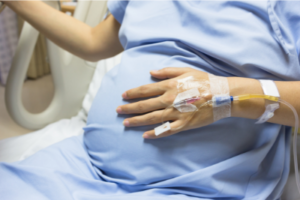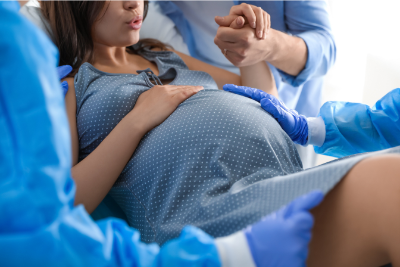It’s no secret that having a baby is an amazing experience — but childbirth can come with a lot of pain and stress. However, today’s pregnant women no longer have to go through this rite of passage without relief.
No matter how close or far away you are from your due date, it’s essential to consider important aspects of your delivery plan, including what kind of pain relief options you would like to have access to where you choose to give birth. Even if you’re planning a natural childbirth experience, it’s beneficial to know pain relief options ahead of time so you can make the best-informed decisions for you and your baby.
Types of Pain Relief During Childbirth and Delivery
Every labor and delivery is unique. Many women choose to manage labor pain and discomfort without medication and have concerns that giving birth in a hospital setting will come with pressure to use medical intervention for pain relief. At West Suburban Medical Center, however, our multidisciplinary medical staff of certified nurse midwives and board-certified obstetricians share a philosophy of care that includes putting the mother in charge of these decisions.
Our staff is experienced in and supportive of low-intervention pain management methods for labor, and many of our patients choose natural ways to manage labor pain, including hypnobirthing, rhythmic breathing exercises, Lamaze birthing practices, and hydrotherapy with our in-suite water tubs. We are also experienced in working collaboratively with doulas and other birthing partners to support a natural childbirth experience.
Natural pain relief methods are not for everyone, however — and that’s just fine! Many expectant parents are unaware of how safe and effective pain medication is for the stress, pain, and discomfort associated with labor and delivery. Although pain in childbirth is natural, in some instances, it can lead to excess stress for both mom and baby that isn’t beneficial to the experience. Whether you’re on the fence about medical pain relief, know the type you want, or are determined to have a natural, non-medicated experience it’s important to understand all your pain relief options.
Medical Pain Relief During Labor
 When you consider the physical and mental toll of the experience, it becomes easier to understand why childbirth is an extremely stressful event for both mom and baby. Anxiety and physical discomfort are at an all-time high due to the intensity of labor contractions, making it challenging to stay focused and engaged. These feelings often become more intense as labor progresses, making a non-medicated or painless birthing experience less likely for some.
When you consider the physical and mental toll of the experience, it becomes easier to understand why childbirth is an extremely stressful event for both mom and baby. Anxiety and physical discomfort are at an all-time high due to the intensity of labor contractions, making it challenging to stay focused and engaged. These feelings often become more intense as labor progresses, making a non-medicated or painless birthing experience less likely for some.
Types of Labor Pain Relief
Pain relief options vary by medical facility and birthing center. Two common types of medication for pain relief during labor and delivery are pain analgesics and anesthetics. Their effects can be felt systematically throughout the entire body, locally where they impact a small area of the body or regionally below the waist.
Analgesics are medications that help reduce pain without decreasing overall sensations and consciousness or affecting the ability to move. This pain relief does not entirely eliminate the discomfort, meaning contractions and pressure can still be felt. However, many women find the reduction in pain they provide is enough.
Nitrous Oxide: This type of analgesic is also called “laughing gas” because of its mood-enhancing effects. Nitrous oxide is a short-acting, tasteless, and odorless gas that’s administered through a mask for inhalation. It’s completely safe for mom and baby. The amount used during childbirth and delivery is much lower than what’s typically required for dental and other medical procedures. The effects are highest while it’s being inhaled and wears off within a few minutes of cessation.
Because nitrous oxide has temporary effects and doesn’t enter the bloodstream, it’s an easy pain control method to stop when the mother wants to move to a different type of pain relief during labor.
 Nitrous oxide doesn’t completely take away the pain and stress, but it works by alleviating pain and anxiety so moms can relax, focus, and remain active participants in the birth experiences. Nitrous oxide is safe enough to use throughout the process or as transitional relief when combined with alternative pain relief options.
Nitrous oxide doesn’t completely take away the pain and stress, but it works by alleviating pain and anxiety so moms can relax, focus, and remain active participants in the birth experiences. Nitrous oxide is safe enough to use throughout the process or as transitional relief when combined with alternative pain relief options.
West Suburban Medical Center was one of the first hospitals in the Chicago area to offer nitrous oxide for maternity pain relief, and it’s a pain relief method that isn’t universally available at hospitals and birth centers in the area.
Sterile Water Papules: West Suburban Medical Center also offers the injection of sterile water papules. These are injected under the skin in an area of the back to help relieve labor pain. For many women, this is very effective in providing relief for lower back pain during labor, but it doesn’t carry as many risks as some more interventional methods.
Epidural: Epidurals are among the most effective pain relieving medications used for vaginal and cesarean (c-section) deliveries. They can be safely administered at most stages of labor, but unlike nitrous oxide, the effects are not as readily reversed.
An epidural works by injecting an anesthetic directly into the epidural space of the spine, preventing the contraction pain signals from reaching the brain. Epidurals also affect your ability to move your lower body, however, so if you opt for an epidural, you’ll be unable to change to some other pain relief methods, such as water labor or ambulation (moving around to relieve pain). But many mothers prefer this method because epidurals completely numb the pain of labor and reduce the pressure of contractions, and the degree of the medicine can be reduced when it becomes time to push for delivery.
To have an epidural administered, moms must be able to hold a specific position while seated for an anesthesiologist to insert an epidural catheter into the lower back. The pain medication administration process takes a few minutes, and the effects are often immediate, but it’s not uncommon for some moms to experience relief several minutes later.
Local Anesthesia: Pain relief medication can be injected into the vaginal and perineal areas to numb the nerves and reduce sensations below. Injectable local anesthetics are often given just before the delivery stage to help ease the pain for mom as the baby enters the world. It can also be used right after delivery when additional medical attention is necessary to repair vaginal tears via episiotomy.
Pudendal Block: A quick injection of a local anesthetic to the pudendal nerve in the perineum is how this pain relief medication is given. This medication is only available during the second stage of labor, and only a single dose is necessary. The effects are limited to the lower body and wear off within an hour or two. This pain relief method is not as common as others, but may be used in deliveries where there are complications, or other pain medications are not as effective.
Spinal Block: This type of regional anesthesia is given as a single injection into the lower back. The effects are immediate since the medication is administered directly into the spinal fluid and wears off within a few hours. Spinal blocks are typically reserved for cesarean patients.
General Anesthesia: General anesthesia is not used as a standard method of labor pain control. But conditions may arise where moms must deliver their babies via emergency cesarean surgery or C-section. In these cases, general anesthesia may be used, if there isn’t time to administer a spinal or epidural block. General anesthesia is a sedating medication that prevents pain and renders patients unconscious. It can be administered intravenously or as an inhalable gas. The effects are fast-acting, and pain relief is complete.
West Suburban Birth Center and Labor Pain Relief
Your choice of pain relief matters. Try to keep an open mind as you research information on the labor pain relief options birthing centers offer.
West Suburban Medical Center offers expectant moms a variety of pain relief solutions for labor to ensure that their birthing experience goes smoothly. Our Family Birthplace also offers specialty maternity care services, water labor, nitrous oxide labor pain relief, midwifery and doula support, and low intervention births.
To learn more about our maternity care services, labor, and delivery pain relief offerings, call 708-763-6518 to set an appointment for a tour of our birth center.

